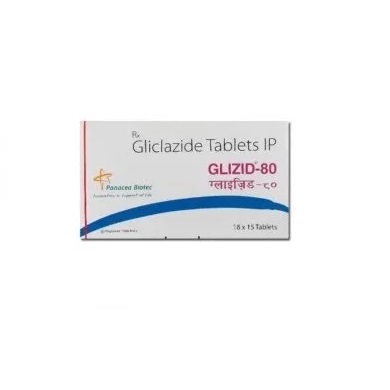Glizid 80mg
Glizid 80mg contains glimepiride, an oral medication used to manage type 2 diabetes. It belongs to the sulfonylurea class, which works by stimulating the pancreas to release more insulin, helping control blood sugar levels.
Glizid 80 mg is typically prescribed along with a balanced diet and regular exercise. The dose varies based on individual response and medical needs. Common side effects may include low blood sugar (hypoglycemia), headache, or dizziness.
Uses
- Type 2 Diabetes Management – Glizid 80 mg (glimepiride) is primarily used to lower blood sugar levels in individuals with type 2 diabetes by stimulating the pancreas to release insulin.
- Adjunct to Diet and Exercise – It is usually prescribed alongside lifestyle changes such as a healthy diet and regular exercise for optimal blood sugar control.
- Improves Insulin Sensitivity – Helps the body respond better to insulin, improving overall glucose control.
- When Diet Alone Isn’t Enough – Glizid is often used when diet, exercise, and weight management alone are insufficient in controlling blood sugar levels.
How to Use Glizid 80mg ?
- Dosage – Take Glizid 80 mg exactly as prescribed by your doctor. The usual starting dose is often 1–2 mg once daily, but it may be adjusted depending on your blood sugar levels.
- Timing – Take Glizid with a meal (typically breakfast) to reduce the risk of low blood sugar (hypoglycemia).
- Swallow Whole – Take the tablet with water. Do not crush, chew, or break it.
- Consistency – Take Glizid at the same time each day for best results.
- Missed Dose – If you miss a dose, take it as soon as you remember unless it’s close to your next dose. Do not take two doses to make up for a missed one.
- Monitor Blood Sugar – Regularly check your blood sugar levels as instructed by your healthcare provider to ensure the medication is working effectively.
How Glizid 80mg Works ?
Glizid 80 mg contains glimepiride, a sulfonylurea medication that helps manage type 2 diabetes by lowering blood sugar levels. Here’s how it works:
- Stimulates Insulin Release – Glimepiride works by stimulating the pancreas to release more insulin. Insulin helps regulate blood sugar levels by allowing glucose to enter cells for energy.
- Improves Insulin Sensitivity – It also helps the body use insulin more effectively, improving insulin sensitivity and reducing the amount of insulin needed to manage blood sugar levels.
- Reduces Blood Sugar Levels – By increasing insulin levels and improving how the body responds to it, Glizid helps lower blood sugar after meals and throughout the day.
Dosage
The dosage of Glizid 80 mg (glimepiride) will depend on individual factors such as blood sugar levels, response to treatment, and medical history. Below are general dosing guidelines:
1. Initial Dose (Adults)
🔹 Start with 1–2 mg once daily, typically taken with breakfast or the first meal of the day.
🔹 Your doctor may adjust the dose based on your blood sugar levels.
2. Maintenance Dose
🔹 The dose can be gradually increased by 1–2 mg increments every 1–2 weeks based on blood sugar control.
🔹 The typical maintenance dose is 4–6 mg once daily, but doses can go up to a maximum of 8 mg/day.
3. Maximum Dose
🔹 8 mg/day is the maximum recommended dose. Higher doses are usually not necessary for effective blood sugar control.
4. In Combination with Other Medications
🔹 If you’re taking other diabetes medications (like metformin), your doctor will adjust the doses of all medications to ensure balanced blood sugar control.
Benefits of Glizid 80 mg (Glimepiride)
- Effective Blood Sugar Control – Glizid 80 mg helps lower blood sugar levels in individuals with type 2 diabetes, improving overall glucose management.
- Stimulates Insulin Release – By stimulating the pancreas to release more insulin, Glizid helps the body process glucose more efficiently.
- Improves Insulin Sensitivity – It enhances the body’s response to insulin, making the body more effective at using the hormone to regulate blood sugar.
- Convenient Once-Daily Dose – Glizid is typically taken once a day, making it easier to manage your treatment regimen.
- Supports a Healthy Lifestyle – When combined with a healthy diet and regular exercise, Glizid helps control blood sugar and reduce the risk of diabetes-related complications.
- Reduces Risk of Complications – By controlling blood sugar levels, Glizid helps prevent or delay the development of complications such as nerve damage, kidney issues, and vision problems related to diabetes.
Side Effects
While Glizid 80 mg is effective in managing type 2 diabetes, it may cause side effects. These can range from mild to serious and include:
Common Side Effects:
- Hypoglycemia (Low Blood Sugar) – The most common side effect, which may cause symptoms like shakiness, sweating, dizziness, confusion, and hunger.
- Nausea – Some people may experience mild stomach upset or nausea.
- Headache – A mild to moderate headache may occur.
- Dizziness – Especially when standing up quickly, due to low blood sugar or blood pressure changes.
Serious Side Effects:
- Severe Hypoglycemia – If blood sugar drops too low, it can cause confusion, fainting, or seizures. Immediate treatment is required.
- Allergic Reactions – Symptoms include rash, itching, swelling (especially of the face or throat), and difficulty breathing.
- Liver Problems – Symptoms include yellowing of the skin or eyes (jaundice), dark urine, or abdominal pain.
- Blood Disorders – Rarely, Glizid may cause low blood cell counts (anemia, leukopenia), leading to fatigue, weakness, or frequent infections.
- Nausea/Vomiting – Severe stomach issues that may require medical attention.
Precautions
Before taking Glizid 80 mg, consider the following precautions to ensure safe and effective use:
- Allergic Reactions – If you are allergic to glimepiride or other sulfonylureas, avoid using Glizid. Inform your doctor of any known allergies.
- Hypoglycemia Risk – Glizid can cause low blood sugar (hypoglycemia), especially if you skip meals, exercise intensely, or drink alcohol. Monitor your blood sugar regularly and be aware of hypoglycemia symptoms (shakiness, sweating, dizziness).
- Liver or Kidney Problems – Glizid is processed by the liver and kidneys. If you have liver or kidney disease, your doctor may need to adjust the dose and monitor your function closely.
- Pregnancy and Breastfeeding – Glizid is generally not recommended during pregnancy or breastfeeding unless specifically prescribed by your doctor. Insulin may be preferred during pregnancy to manage blood sugar levels.
- Alcohol Consumption – Drinking alcohol can increase the risk of hypoglycemia or cause other side effects like nausea and dizziness. It is best to limit or avoid alcohol while on Glizid.
- Interactions with Other Medications – Inform your doctor about all other medications you are taking, including over-the-counter drugs, vitamins, and herbal supplements. Some medications can interact with Glizid, affecting its effectiveness or increasing side effects (e.g., other diabetes medications, blood pressure drugs).
- Severe Infections or Surgery – If you are undergoing surgery or have a severe illness (especially with fever), Glizid may need to be temporarily stopped or adjusted, as your blood sugar levels could fluctuate.
- Pregnancy Planning – If you’re planning to become pregnant, consult your doctor about switching to another diabetes medication.
- Diet and Exercise – Maintain a balanced diet and regular exercise routine to support blood sugar control while taking Glizid. Your doctor may provide specific guidelines.
Frequently Asked Questions
What is Glizid 80mg used for?
Glizid 80 mg is used to manage type 2 diabetes by lowering blood sugar levels. It works by stimulating the pancreas to release insulin and improving the body’s sensitivity to insulin.
How should I take Glizid 80mg?
Take Glizid 80 mg once daily with a meal, typically breakfast. Swallow the tablet whole with water. Follow your doctor’s instructions for the correct dosage.
Can Glizid 80mg cure diabetes?
No, Glizid does not cure diabetes. It helps manage blood sugar levels effectively when combined with a healthy diet, exercise, and regular monitoring.
What happens if I miss a dose?
If you miss a dose, take it as soon as you remember, unless it’s nearly time for your next dose. Do not take two doses to make up for a missed one.
Can I drink alcohol while taking Glizid?
It’s advisable to limit or avoid alcohol while taking Glizid, as it can increase the risk of hypoglycemia (low blood sugar) and other side effects.
What are the common side effects of Glizid 80mg ?
Common side effects include low blood sugar (hypoglycemia), nausea, headache, and dizziness. If you experience severe side effects, contact your doctor.
Can Glizid be used in pregnancy?
Glizid is generally not recommended during pregnancy. Consult your doctor to switch to another medication if you’re pregnant or planning to become pregnant.
How does Glizid 80mg work?
Glizid stimulates the pancreas to release more insulin and helps the body respond better to insulin, improving blood sugar control.
Can I take Glizid 80mg with other diabetes medications?
Yes, Glizid may be used in combination with other diabetes medications (such as metformin). Your doctor will adjust your treatment based on your individual needs.
How often should I check my blood sugar?
Regular blood sugar monitoring is essential to ensure Glizid is working effectively. Your doctor will guide you on how often to check your blood sugar levels.
Conclusion
Glizid 80 mg is an effective treatment for managing type 2 diabetes by improving insulin secretion and sensitivity. When used with a healthy diet and exercise, it helps control blood sugar levels. While it offers numerous benefits, it’s important to monitor for side effects like hypoglycemia and follow your doctor’s guidance for safe use.











Reviews
There are no reviews yet.